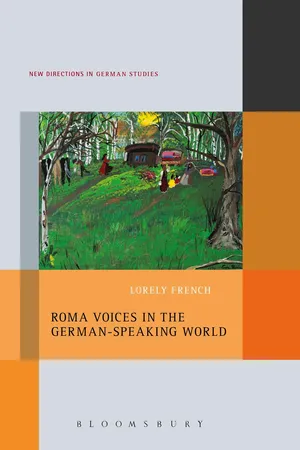
- 256 pages
- English
- PDF
- Available on iOS & Android
Roma Voices in the German-Speaking World
About This Book
The Roma are Europe's largest minority, and yet they remain one of the most misunderstood and underrepresented. Scholarship on the Roma in German-speaking countries has focused mostly on the portrayal of "Zigeuner/Gypsies" in literature by non-Roma and on persecution during the Nazi period. Rarely have scholars examined the actual voices of Roma to glean their perspectives on their social interactions and customs. Without such studies the Roma appear passive in the face of their long and troubled history. With a basis in theories of intersectionality, subalternity, and cultural hybridity, Roma Voices in the German-Speaking World rectifies this image of passivity by analyzing autobiographies, folktales, and novels by Roma, thereby promoting a better understanding of the multifaceted and multifarious cultures alive today in Germany, Austria, and Switzerland. In documenting their voices, Roma writers unveil the large extent to which their personal lives, their social interactions with other Roma and non-Roma, and the images they project of their values and traditions are highly influenced by gender and ethnicity. Anthropological and historical studies have frequently portrayed Romani groups as displaying a patriarchal social structure with highly demarcated roles for men and women. In contrast, the significant parts that both men and women play in disseminating autobiographical, fictional, and historical narratives challenge this ubiquitous notion of largely patriarchal Romani cultures. The insights that both sexes provide on the relationship between gender and ethnicity in the context of cultural taboos, norms, and expectations unveil the complexities and diversities inherent in any minority group and its relationship to the dominant society.
Frequently asked questions
Information
Table of contents
- FC
- New Directions in German Studies
- Volumes in the series:
- Title
- Copyright
- Dedication
- Contents
- Illustrations
- Preface and Acknowledgments
- Introduction: “For only together we are strong”
- 1 Justifications, Theories, and Methodologies
- 2 “I am eternally proud to be a Gypsy”: Roma Voicing Ethnicity
- 3 “I couldn’t talk with anyone else about this”: Roma Voicing Gender
- 4 “We were totally uprooted”: Romani Perspectives on the Porrajmos/Holocaust
- 5 “I live with my deceased”: Trauma, Gender, and Ethnicity in Autobiographies by Ceija, Karl, and Mongo Stojka
- 6 “It was, because it wasn’t”: Gender and Ethnicity in Folk Tales, Fairy Tales, and Wonder Tales
- 7 “The emotions are autobiographical, the story is fictional”: Violence in Mariella Mehr’s Trilogy
- 8 “It is a kind of life in conflict, between two worlds”: Voices of the Post-Porrajmos/Holocaust Generation
- Epilogue: Writing as “the art of survival”
- Appendix: Biographies of Romani Writers
- Bibliography
- Index